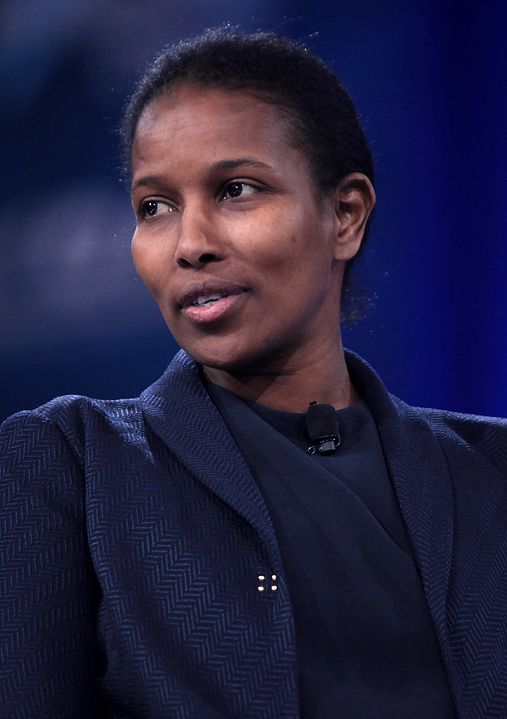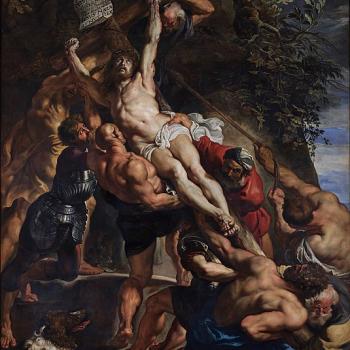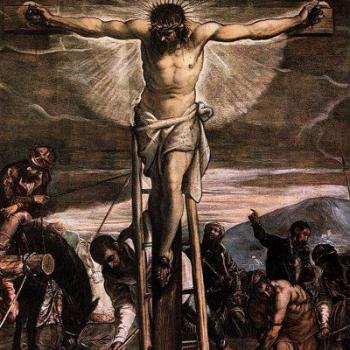Ayaan tells about growing up under Islam, which had mostly been about prayers, fastings, and other observances. But then as a teenager she fell under the spell of the Muslim Brotherhood, which taught a strict, black-and-white, obey-or-be-damned version of Islam that is at the root of today’s Islamic radicalism.
Then came the rise of Islamic terrorism and the 9/11 attacks. She strongly and publicly condemned them, making a name for herself as a critic of radical Islam.
A year later, Ayaan read Bertrand Russell’s 1927 essay “Why I am Not a Christian.” “It was a relief to adopt an attitude of scepticism towards religious doctrine, discard my faith in God and declare that no such entity existed,” she writes. “Best of all, I could reject the existence of hell and the danger of everlasting punishment.”
Russell’s assertion that religion is based primarily on fear resonated with me. I had lived for too long in terror of all the gruesome punishments that awaited me. While I had abandoned all the rational reasons for believing in God, that irrational fear of hellfire still lingered. Russell’s conclusion thus came as something of a relief: “When I die, I shall rot.”
She became an atheist. She became friends with the “New Atheists” Christopher Hitchens and Richard Dawkins. In fact, she was sometimes mentioned with them as one of the “horsemen” of that movement.
So what changed for her, directing her to Christianity? She writes,
Western civilisation is under threat from three different but related forces: the resurgence of great-power authoritarianism and expansionism in the forms of the Chinese Communist Party and Vladimir Putin’s Russia; the rise of global Islamism, which threatens to mobilise a vast population against the West; and the viral spread of woke ideology, which is eating into the moral fibre of the next generation.
Ayaan says that the “secular tools” we have been trying to use–“military, economic, diplomatic and technological efforts to defeat, bribe, persuade, appease or surveil”–are not working.
The response that “God is dead!” seems insufficient. So, too, does the attempt to find solace in “the rules-based liberal international order”. The only credible answer, I believe, lies in our desire to uphold the legacy of the Judeo-Christian tradition.
That legacy consists of an elaborate set of ideas and institutions designed to safeguard human life, freedom and dignity — from the nation state and the rule of law to the institutions of science, health and learning. As Tom Holland has shown in his marvellous book Dominion, all sorts of apparently secular freedoms — of the market, of conscience and of the press — find their roots in Christianity.
I’m thinking that Dominion: How the Christian Revolution Remade the World is shaping up to be one of the most effective apologetics books of our time. It decisively refutes the New Atheists’ insistence that, in the words of the subtitle of one of Hitchen’s books, “religion poisons everything.” To the contrary, Holland, a respected historian, shows that Christianity–and only Christianity–is the source of the benevolent values that the New Atheists holds dear. Read this post and this post about the book.
But Ayaan was drawn to Christianity for more than just cultural reasons:
Yet I would not be truthful if I attributed my embrace of Christianity solely to the realisation that atheism is too weak and divisive a doctrine to fortify us against our menacing foes. I have also turned to Christianity because I ultimately found life without any spiritual solace unendurable — indeed very nearly self-destructive. Atheism failed to answer a simple question: what is the meaning and purpose of life? . . . .
That is why I no longer consider myself a Muslim apostate, but a lapsed atheist. Of course, I still have a great deal to learn about Christianity. I discover a little more at church each Sunday. But I have recognised, in my own long journey through a wilderness of fear and self-doubt, that there is a better way to manage the challenges of existence than either Islam or unbelief had to offer.
Pray for her.
Photo: Ayaan Hirsi Ali by Gage Skidmore, CC BY-SA 3.0, https://commons.wikimedia.org/w/index.php?curid=47476351

















